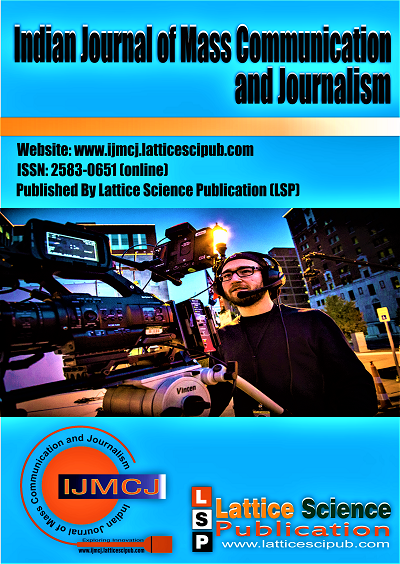The Future of Yellow Journalism in India
Main Article Content
Abstract
This research aims to understand how the media work in India regarding Yellow Journalism has influenced the thinking of the citizens. In India, Yellow Journalism has only picked up in the last one to two decades and has spread widely all-around India affecting the readers. The purpose of the development of Tv channels, newspaper, and magazines are to be the first to publish the news and to encourage higher circulation than the other newspapers in India. Yellow journalism has been characterized as a pure form of commerce rather than legitimate journalism. The research goal is to find out if most of India’s news and the media are based on exaggeration and how other countries are starting to practice Yellow Journalism. A qualitative research method was applied to this study and analyzed through the case studies using the document analysis design, with an inductive research approach, which depends on inductive reasoning. In spite of the fact that media has the opportunity to publish and broadcast data within the frame of news and entertainment, certain standards, rules, and controls should have been adhered to. Efforts are being undertaken all around the world to form guidelines and standards for media consideration.
Downloads
Article Details

This work is licensed under a Creative Commons Attribution-NonCommercial-NoDerivatives 4.0 International License.
How to Cite
References
Campbell, W. J. (2001). Yellow Journalism: Puncturing the Myths, Defining the Legacies. United States: Praeger.
Chakraborty, I. (2016, January 13). Yellow Journalism: The Dark Side of Media. Retrieved from Indians 4 Social Change: https://indians4sc.org/2016/01/13/yellow-journalism-the-dark-side-of-media/
Chapter 3: Emergence and Revival of the Press Council. (n.d).
Desai, D. R. (2014, February 1). Drrajivdesai. Retrieved from Media: https://drrajivdesaimd.com/2014/02/01/media/
(2019). Highest Circulated Publication. India: Audit Bureau of Circulation.
Jadhav, R. (2012). M. K. Gandhi’s Satyagrahi Model of Journalistic Ethics. EBSCO, 12(12), 80-97. Retrieved from
https://www.academia.edu/7789160/M_K_Gandhi_s_Satyagrahi_Model_of_Journalistic_Ethics
Khaliq, R. u. (2019, May 29). Indian media market is controlled by powerful few. Retrieved from AA Kariyer:
https://www.aa.com.tr/en/asia-pacific/-indian-media-market-controlled-by-powerful-few-/1492311
Khan, R. M. (2021, June 11). Pakistan Observer. Retrieved from Limits of freedom of speech and expression | By Raza Muhammad
Khan: https://pakobserver.net/limits-of-freedom-of-speech-and-expressionby-raza-muhammad-khan/
Mayer, C. (2019). Producing Mass Entertainment: The Serial Life of the Yellow Kid. Ohio State University Press. [CrossRef]
Mott, F. L. (1941). American Journalism. Routledge.
Munir, S. (n.d). Impact of Yellow Journalism on Society. Journal of Media and Development. Retrieved from http://www.jdhr.org/publications/media-and-development/Impact%20of%20Yellow%20Journalism%20on%20Society.pdf
Nain, B. (2014, February 05). Need to Regulate Yellow Journalism in India. Retrieved from Youth Forum:
https://youthforum.co/need-to-regulate-yellow-journalism-in-india/
Prasad, J. C. (2017, August 22). Press Council: India. Retrieved from Accountable Journalism: https://accountablejournalism.org/press-councils/India
Shaukat, S. (2013, December 14). TV Channels Promote Yellow Journalism. Retrieved from Read Supported News: https://readersupportednews.org/pm-section/21-21/20963-tv-channels-promote-yellow-journalism
Swami., R. C. (N.d). Yellow Journalism. Retrieved from India Law Journal: https://www.indialawjournal.org/archives/volume2/issue_1/article_by_Rituj_and_Suchi.html
Wood, M. (2004). Selling the Kid: The Role of Yellow Journalism. The Yellow Kid on the Paper Stage: Acting out Class Tensions and
Racial Divisions in the New Urban Environment. Retrieved from http://xroads.virginia.edu/~MA04/wood/ykid/yj.htm





